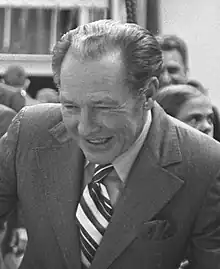| |||||||||||||||||||||||||||||
| |||||||||||||||||||||||||||||
| |||||||||||||||||||||||||||||
| Elections in California |
|---|
 |
The 1973 election for Mayor of Los Angeles took place on April 3, 1973, with a run-off election on May 29, 1973. Incumbent Sam Yorty was defeated by councilman Tom Bradley in a rematch of the 1969 mayoral election.[1]
Yorty's growing apathy towards the office of Mayor and his previous tactics against Bradley would be the main points of criticisms towards him, and coupled with Bradley's popularity would lead to his defeat. The election would make Bradley the first African-American mayor of Los Angeles.[2]
Municipal elections in California, including Mayor of Los Angeles, are officially nonpartisan; candidates' party affiliations do not appear on the ballot.[3]
Election
Although Yorty was re-elected in 1969, he started to show boredom in his position as Mayor as he had travelled out of the city for most of his tenure. He ran for governor in 1970 and lost to Speaker of the California State Assembly Jesse M. Unruh, later running for the Democratic nomination for President in 1972 before ending his bid before the California primary. Yorty then announced that he was running for Mayor, seeking an unprecedented fourth term in office.
He was again challenged by Councilman Tom Bradley, making his second run for the office, as well as Unruh, LAPD Chief Thomas Reddin, councilmember Joel Wachs, and actor Bob Dornan.[4][5] Polls frequently had Bradley having a substantial lead over Yorty and the other candidates, although some speculated that Unruh or Reddin could advance to the primary with Bradley instead of Yorty.[6] In the primary, Bradley and Yorty advanced to the runoff election again, setting the stage for a rematch of the 1969 mayoral election.[7][8]
In the ensuing campaign, Bradley criticized Yorty for visiting convicted income tax evader Josn Alessio alongside Phil Regan, who would later be convicted of bribery; Yorty attacked Bradley for allegedly "accepting loans tied to gambling interests."[9] Polls showed Bradley leading Yorty in the race, although Yorty discounted the polls as he had won the previous election with polls showing the same thing.[10] This time, however, Bradley defeated Yorty to become Mayor, ending Yorty's tenure of 12 years.[11] After his loss, Yorty changed his party affiliation from Democrat to Republican in September 1973.[12]
Results
Primary election
| Candidate | Votes | % | |
|---|---|---|---|
| Tom Bradley | 233,789 | 35.39 | |
| Sam Yorty (incumbent) | 190,649 | 28.86 | |
| Jesse M. Unruh | 114,693 | 17.36 | |
| Thomas Reddin | 83,930 | 12.70 | |
| Joel Wachs | 24,907 | 3.77 | |
| Bob Dornan | 4,849 | 0.73 | |
| Olga L. Rodriguez | 2,326 | 0.35 | |
| Ray Bagley | 2,118 | 0.32 | |
| Eileen Anderson | 1,037 | 0.16 | |
| Malbour L. Watson | 792 | 0.12 | |
| Walter R. Buchanan | 685 | 0.10 | |
| Leonard Orr | 555 | 0.08 | |
| James A. Ware | 371 | 0.06 | |
| Total votes | 660,701 | 100.00 | |
General election
| Candidate | Votes | % | |
|---|---|---|---|
| Tom Bradley | 433,473 | 56.34 | |
| Sam Yorty (incumbent) | 335,857 | 43.66 | |
| Total votes | 769,330 | 100.00 | |
References and footnotes
- ↑ "L.A. HAS NEW MAYOR". The California Aggie. July 5, 1973.
- ↑ "Bradley Takes Office As New L.A. Mayor". Santa Cruz Sentinel. July 2, 1973.
- ↑ "LOS ANGELES: STRUCTURE OF A CITY GOVERNMENT" (PDF). League of Women Voters.
- ↑ "L.A. Voting Tuesday". The Desert Sun. April 2, 1973.
- ↑ Pinkley, Virgil (March 18, 1973). "For Your Information". Palos Verdes Peninsula News.
- ↑ "Poll Declares Bradley Top Mayor Choice". The Desert Sun. January 26, 1973.
- ↑ Hanna, Paul (May 10, 1973). "Mayor's Race Just A Repeat". The Desert Sun.
- ↑ "Runoff Set For Bradley, Yorty". The Daily Sun. April 3, 1973.
- ↑ "Mayor Rivals Battle". The Daily Sun. May 8, 1973.
- ↑ "Sam Yorty Discounts LA. Poll". The Daily Sun. May 29, 1973.
- ↑ "A Profile Of Tom Bradley, Los Angeles' New Mayor". Santa Cruz Sentinel. May 30, 1973.
- ↑ "Yorty Signs As Republican". The Desert Sun. September 10, 1973.
- ↑ "Los Angeles Mayor - Primary". Our Campaigns.
- ↑ "Yorty, Bradley Press Drive for Election Today", Los Angeles Times, May 29, 1973, p. I-1
.jpg.webp)



_edit1.jpg.webp)
